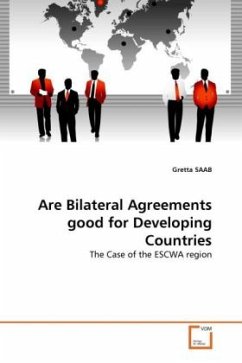This study is a developing country perspective related to the proliferation of bilateral agreements, their importance and relevance for the trading partners. Our study assesses these bilateral agreements and examines their potential contribution to growth in trade for the Economic and Social Commission of Western Asia (ESCWA region).Looking at the world map today we notice that most industrial and developing countries are members of a FTA, and many belong to more than one trade bloc creating what was advanced by Bhagwati as the "spaghetti bowl". A familiar gravity model will be used to see if these agreements correspond to the theory behind it or if it is as Viner famously discusess it in terms of trade creation and trade diversion. Our results show a negligeable benefit since there is no particular impact of these agreements on the economy of the developing countries of the ESCWA region and their trade
Bitte wählen Sie Ihr Anliegen aus.
Rechnungen
Retourenschein anfordern
Bestellstatus
Storno








